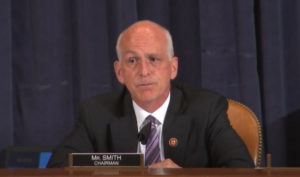The House Armed Services Committee early Thursday morning advanced its version of the next defense policy bill, with a new topline of nearly $840 billion, by a bipartisan 57 to 1 vote.
Following more than 16 hours of debate, the panel approved adopting additional measures to the fiscal year 2023 National Defense Authorization Act ranging from efforts to bolster initiatives in the Indo-Pacific to shoring up the supply of critical rare Earth minerals.

“Meeting our country’s future defense challenges requires rigorous debates and tough choices about what the Department of Defense and U.S. military need. Faced with these challenges, this committee has once again delivered a result that, for whatever our disagreements may be, ultimately does right by service members, civilians, and their families – the heart of our country’s defense. I thank Ranking Member Rogers for his partnership throughout this process and his many contributions to this bill and look forward to our bipartisan collaboration as the NDAA advances to the House floor,” Rep. Adam Smith (D-Wash.), the HASC chair, said in a statement.
Among the most significant provisions adopted during Wednesday’s HASC NDAA markup was the panel’s 42 to 17 vote in favor of boosting its topline by $37 billion (Defense Daily, June 22).
The amendment, proposed by Rep. Jared Golden (D-Maine), supports $7.4 billion for dealing with inflation impacts, $550 million more for the Ukraine Security Assistance Initiative, $660 million to procure eight additional F/A-18s and $3.5 billion to build five additional ships, including one DDG, one FFG, one T-AO oiler and two more Expeditionary Medical Ships, as well as blocking the planned retirement of five Littoral Combat Ships (LCS).
The increase lifts HASC’s NDAA topline to $839.4 billion, still below the Senate Armed Services Committee’s $847 billion version of the bill, which it voted 23 to 3 advance last week after adopting its own $45 billion topline increase (Defense Daily, June 16).
Rep. Ro Khanna (D-Calif.) was the sole vote against final passage of the bill, and had been strong in his opposition to raising the topline during debate earlier in the markup.
“Part of me wonders when we are just going to get the amendment to have a trillion-dollar defense budget because it seems that’s where we are going,” Khanna said. “I just want to be clear, there is no country in the world that is putting over half its discretionary budget into defense and I would rather for us to be the preeminent economy of the 21st century by investing in the health of our people, in the education of our people, in the industries of the future as we compete with China.”
Much of the lengthy markup debate well into the night focused on Republican committee members’ proposals for blocking COVID-19 vaccine mandates, banning the teaching of critical race theory and discussions related to extremism in the military.
HASC, however, did adopt measures included in large bipartisan amendment packages such as a proposal from Rep. Seth Moulton (D-Mass.) directing the Pentagon to report on all missions that could be completed by AI or autonomous systems and one from Rep. Scott DesJarlais (R-Tenn.) for the director of the Defense Intelligence Agency to brief on China and Russia’s hypersonic test capability.
The committee also adopted an amendment from Rep. Joe Courtney (D-Conn.), chair of the HASC Seapower and Projection Forces Subcommittee, that requires the Secretary of the Navy to brief lawmakers on the use of drones in anti-submarine warfare.
Several measures were adopted to HASC’s NDAA aimed at INDOPACOM-related matters, to include an updated briefing on the Pacific Deterrence Initiative, authorizing an additional $66 million for INDOPACOM unfunded priorities and requiring a report on lessons learned from Russia’s ongoing invasion of Ukraine that could be applied to potential conflict in the Indo-Pacific region.
Lawmakers also approved a group of amendments related to critical minerals stockpiles, including a requirement to boost the National Defense Stockpiles amount of rare Earth metals, requiring the Secretary of Defense to report on a study of alternatives for such rare Earth minerals and directing a briefing on opportunities to expand cooperating with allies and partners on critical minerals efforts.
HASC also moved to restore $45 million in funding to continue development of a nuclear-tipped sea-launched cruise missile, reversing the Navy’s proposal to cancel the program (Defense Daily, June 22).